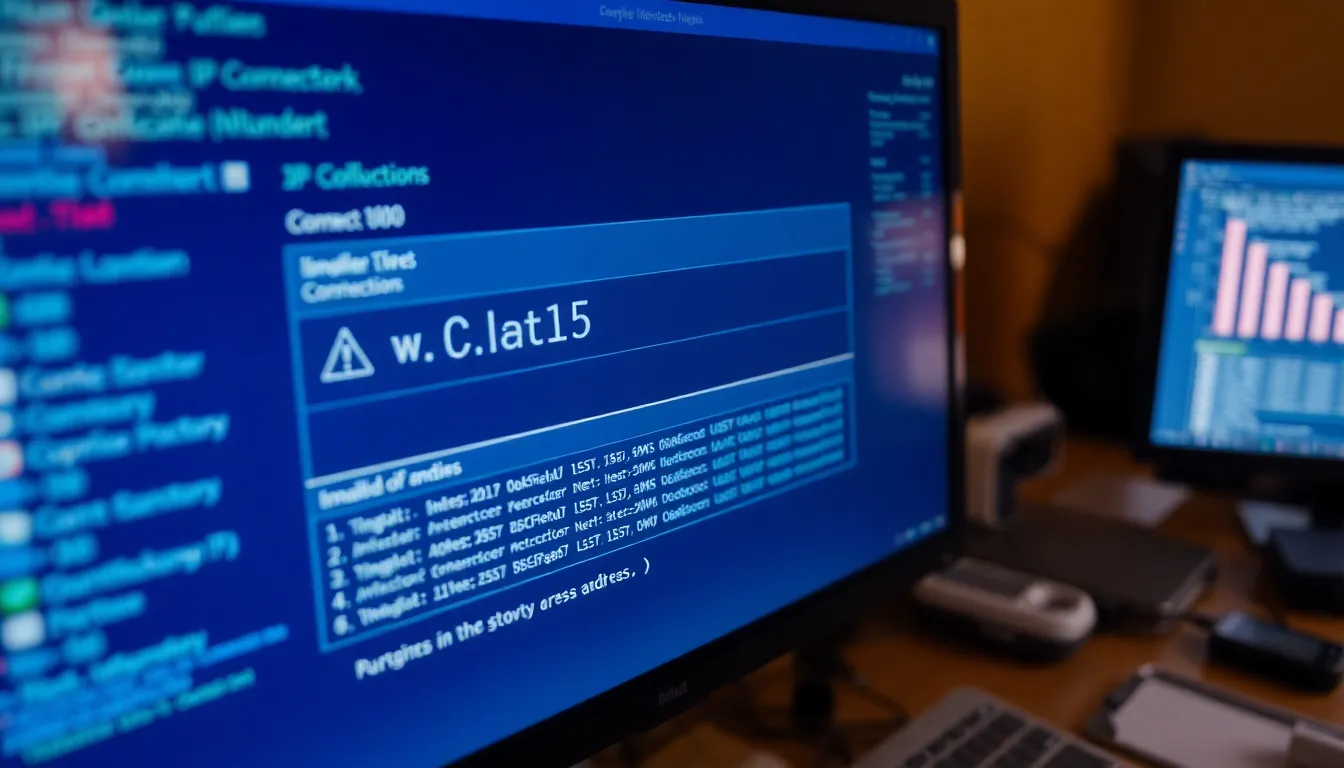In the vast world of the internet, IP addresses play a crucial role in connecting devices and facilitating communication. Among these, the IP address 158.63.258.200 stands out, raising questions about its origin and purpose. Understanding this specific address can shed light on the intricacies of online interactions and security.
This article delves into the significance of 158.63.258.200, exploring its potential uses and implications. Whether it’s linked to a particular organization or a gateway for cyber activity, knowing more about this IP can enhance one’s grasp of internet dynamics. Join the journey to uncover the mysteries behind this intriguing numerical sequence.
Table of Contents
ToggleOverview of 158.63.258.200
IP address 158.63.258.200 serves as a unique identifier in the digital landscape, facilitating communication between devices. This address belongs to the class of IPv4 addresses, which consist of four octets, each ranging from 0 to 255. However, 258 exceeds the maximum allowable value in an octet, making 158.63.258.200 an invalid IP address for routing on the internet.
Understanding the implications of invalid IP addresses underscores the importance of accurate address configuration in network communications. An invalid IP address, such as 158.63.258.200, generates issues for users and systems attempting to establish connections. Systems may return errors or fail to locate the address altogether.
In analyzing IP addresses, some tools and databases aid in identifying the ownership and geographical locations associated with valid addresses. For valid ranges, organizations can trace ownership through registries like ARIN, RIPE, or APNIC. Such tools enhance understanding of potential cybersecurity risks or origins of traffic tied to specific addresses.
For educational purposes, exploring the nuances of IP address validity highlights key aspects of network management and security, providing insights into how both valid and invalid addresses impact online interactions.
Reasons to Investigate 158.63.258.200

Investigating the IP address 158.63.258.200 reveals potential risks associated with invalid addresses and emphasizes the importance of understanding IP addresses in cybersecurity.
Potential Risks
Invalid IP addresses like 158.63.258.200 can disrupt network connections and cause errors. These issues may lead to wasted resources, as systems attempt to resolve non-functional addresses. Additionally, entities may misuse invalid addresses in cyber attacks or phishing scams. Recognizing such addresses helps avoid falling victim to malicious activities, highlighting the necessity of vigilant network management.
Benefits of Understanding IPs
Understanding IP addresses, including invalid ones like 158.63.258.200, offers several benefits. Knowing the structure and use of IP addresses aids in troubleshooting connectivity issues. It also facilitates better security practices through monitoring valid addresses for unusual activities. Awareness of IP functionality fosters a proactive approach to network safety, allowing for improved incident response and threat mitigation strategies.
Analyzing the Source of 158.63.258.200
Examining the details surrounding the IP address 158.63.258.200 reveals its invalidity and the implications associated with invalid addresses. Understanding this context aids in identifying cybersecurity threats and enhancing network security measures.
Geolocation Insights
Geolocation information typically linked to valid IP addresses helps pinpoint user locations and enhance network routing. However, 158.63.258.200, being invalid, lacks geolocation data, which prevents accurate tracking. Valid addresses are crucial for mapping physical locations to digital identities and fostering effective communication. IP databases can provide insights for valid addresses by indicating country, region, and ISP data. For effective cybersecurity management, recognizing and validating IP addresses mitigates risks linked to geolocation inaccuracies.
Association with Providers
IP addresses associate with specific internet service providers (ISPs), offering critical information about data routing and ownership. The invalid IP address 158.63.258.200 does not correlate to any known ISP, highlighting its status outside the operational domain. Valid IP addresses, on the other hand, assist network administrators in monitoring traffic and identifying sources of potential threats. ISPs play a vital role in maintaining internet infrastructure, making knowledge of applicable addresses essential for effective network management and potential issue resolution. Monitoring valid address allocations enables administrators to identify unusual patterns that could indicate malicious behavior.
User Experiences with 158.63.258.200
User experiences with the IP address 158.63.258.200 reflect various challenges due to its invalid status. Users attempting to connect through this address encounter immediate issues such as failed connection messages and error codes. These problems stem from the address’s octet exceeding the maximum allowable limit, making it non-functional within standard IP configurations.
Users expressing concern report difficulties in accessing services tied to this address. Networking tools that provide insights on IP addresses can’t fetch relevant data, as 158.63.258.200 does not match any known geolocation or ISP. This lack of information complicates troubleshooting efforts as users cannot trace issues back to legitimate sources.
Users engaging in cybersecurity discussions highlight risks associated with invalid IP addresses. Instances of phishing attempts using bogus IP addresses raise alarms over potential scams. Users emphasize the importance of rigorous network security measures to identify and block such problematic addresses.
Users involved in network management emphasize validating IP addresses before implementation. They recommend utilizing reliable tools and databases to check IP address legitimacy. Proactive management helps prevent disruptions, protecting both user data and network integrity.
Tips for Protecting Against Unwanted Traffic
- Implement Firewalls: Firewalls act as a barrier between a trusted network and untrusted networks. They inspect incoming and outgoing traffic to filter out malicious requests.
- Utilize Intrusion Detection Systems (IDS): IDS monitor network traffic for suspicious activity. They alert administrators of potential threats, enabling faster responses to security breaches.
- Employ IP Address Filtering: Administrators can block known malicious IP addresses. Filtering rules can prevent unwanted traffic from accessing the network.
- Regularly Update Security Software: Regular updates ensure defenses are equipped against the latest threats. They fix vulnerabilities and improve overall security efficacy.
- Conduct Network Traffic Analysis: Regular analysis of network traffic helps identify unusual patterns. Understanding normal traffic behavior enables quicker detection of potential attacks.
- Educate Users on Security Practices: Training end-users can mitigate human error, which often leads to security breaches. Users should recognize phishing attempts and unsafe browsing habits.
- Use VPNs for Remote Access: Virtual Private Networks encrypt data, providing secure connections for remote users. They help protect against interception of sensitive information.
- Implement Multi-Factor Authentication (MFA): MFA adds an extra layer of security beyond passwords. It decreases the likelihood of unauthorized access to sensitive data.
- Perform Regular Security Audits: Scheduled audits assess the current security posture. They identify vulnerabilities in the system that could be exploited by malicious actors.
- Establish Incident Response Plans: Preparedness for security incidents enhances recovery efficiency. These plans outline steps to take when unauthorized access occurs, reducing potential damage.
Conclusion
Understanding the implications of invalid IP addresses like 158.63.258.200 is crucial for maintaining network security. Users must be aware of the challenges these addresses pose, including connection failures and potential cybersecurity risks. By prioritizing the validation of IP addresses and utilizing reliable tools, individuals and organizations can protect their networks from disruptions and malicious activity.
Implementing strong security measures such as firewalls and intrusion detection systems further enhances protection against unwanted traffic. Regular updates and user education are essential in fostering a secure environment. Proactive management of IP addresses not only safeguards data integrity but also promotes a more resilient network infrastructure.



